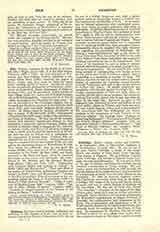

Cole, HENRY, confessor of the Faith, b. at Gods-hill, Isle of Wight, about 1500; d. in the Fleet Prison, February, 1579 or 1580. He was educated at Winchester and New College, Oxford, admitted a perpetual fellow there (1523), received the degree of B.C.L. (1525), and then went to Italy for seven years, residing chiefly at Padua. During his career he was successively prebendary of Yatminster (1539), rector of Chelmsford, Essex, prebendary of Holborn, Sweting (1541), and Wenlakesbarn (1542), warden of New College (1542-51), and rector of Newton Longueville in Buckinghamshire. Created D.C.L. at Oxford (1540), he resigned his fellowship the same year. At first he conformed to the Protestant religion, but afterwards saw his error, returned to the Catholic Faith about 1547, and eventually resigned all his preferments. In Mary’s reign he became Archdeacon of Ely, a canon of Westminster (1554), vicar-general of Cardinal Pole (1557), and a judge of the archiepiscopal Court of Audience. He was one of the commissioners who restored Tunstal and Bonner to their bishoprics, a disputant against Cranmer, Ridley, and Latimer at Oxford (1554), a delegate for the visitation of Oxford (1556), and Visitor of All Souls College in 1558, in which year he received the rectory of Wroth-am, and was sent to Ireland with a commission for the suppression of heresy there. Cardinal Pole appointed Cole one of his executors. During Elizabeth‘s reign he remained true to the Catholic Faith and took part in the discussions begun at Westminster in 1559. Then began his sufferings: first, he was fined 500 marks ($1600), then deprived of all his preferments, committed to the Tower (May 20, 1560), and finally removed to the Fleet (June 10), where he remained for nearly twenty years, until his death. He wrote: letters to Dr. Starkey and Sir Richard Morysin from Padua, 1530, and Paris, 1537; “Disputation with Cranmer, Ridley and Latimer at Oxford“, in Fox’s “Acts and Monuments”; “Sum and effect of his sermon at Oxford when Archbishop Cranmer was burnt”, in Fox’s “Acts and Monuments”; “Answer to the first proposition of the Protestants at the disputation before the Lords at Westminster, 1559”, in Burnet’s “Hist. Reform. Records”; “Copie of a Sermon at Paule’s Crosse 1560” (London, 1560); “Letters to John, Bishop of Sarum” (London, 1560);
G. E. HIND

